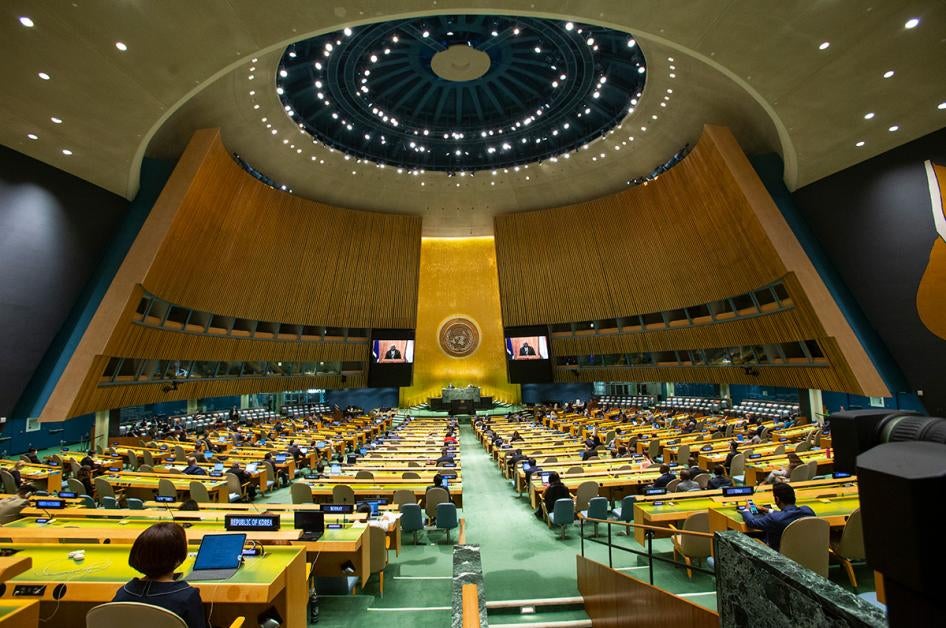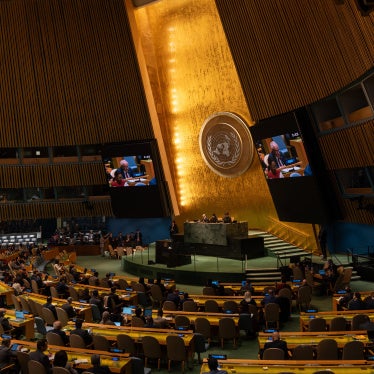(New York, September 15, 2023) – World leaders attending the upcoming session of the United Nations General Assembly should urge accountability for the world’s human rights crises, Human Rights Watch said today. More than 140 leaders are expected in New York City for the UN’s annual General Debate, its most high-profile event of the year, which runs from September 19 to 26, 2023.
Government leaders should discuss action plans for feeding the world’s hungry, addressing the devastating impacts of climate change, and reimagining the global health architecture. They should specifically seek justice for Russia’s war crimes in Ukraine, atrocities by Sudan’s warring parties, Israel’s apartheid against Palestinians, the Taliban’s gender persecution of women and girls, and China’s crimes against humanity in Xinjiang. It is also critical for world leaders to shine a spotlight on neglected crises such as Haiti, Nagorno-Karabakh, and the Chagos archipelago.
“The UN’s annual General Debate provides world leaders with a bully pulpit to speak out on the world’s most pressing human rights issues,” said Louis Charbonneau, UN director at Human Rights Watch. “They should all make use of this golden opportunity to generate discussion on world crises, finding justice for ongoing abuses, or bringing attention to issues outside the headlines.”
UN Secretary-General Antonio Guterres has urged the UN’s 193 member countries to focus greater attention on issues that are priorities for developing countries, including climate change and meeting the UN’s Sustainable Development Goals aimed at eradicating poverty. Meeting the Sustainable Development Goals is crucial to the rights to health, water, sanitation, food, and education, among others. Halfway toward the 2030 deadline for achieving those goals, they appear to be increasingly in jeopardy. This largely reflects the indifference of many governments to address those issues. Officials should stop looking at Sustainable Development Goals as optional, but instead see them as vital and obligatory rights, Human Rights Watch said.
Guterres will host high-level meetings on climate change and development on the sidelines of the UN General Assembly. Leaders should be prepared to make concrete pledges of action to confront increasingly frequent extreme weather events and rising poverty. They should also express their support for expanded opportunities for justice for grave crimes, such as a treaty that strengthens international protections for crimes against humanity.
Leaders should publicly highlight the countless abuses committed by Russian forces against Ukrainian civilians and the hundreds of millions of people facing hunger worldwide because of Russia pulling out of the UN-brokered Black Sea Grain Initiative.
Leaders should also urge the UN Security Council to take action to stop mass atrocities in Sudan, which the heads of more than 50 international human rights and humanitarian organizations, including Human Rights Watch, have called for. The leaders should also urge the Security Council to urgently adopt measures to stem the Myanmar military’s ongoing atrocities.
Leaders should push for accountability for international crimes committed by the Taliban in Afghanistan. More than two years after the Taliban returned to power, they are subjecting women and girls to severe restrictions and discrimination that amount to the crime against humanity of gender persecution. Country delegations should urge the UN leadership to update member countries on the Chinese government’s implementation of recommendations in the 2022 report by the UN human rights office on possible crimes against humanity against Uyghurs and other Turkic Muslims.
World leaders should endorse the growing recognition globally that the Israeli government’s systematic oppression of Palestinians amounts to the crime against humanity of apartheid. They should take action to end it and hold those responsible to account, including by supporting the International Criminal Court’s Palestine investigation and urging Guterres to list Israel’s armed forces in his annual report on grave violations against children in armed conflict.
Country delegations should commit to working with the UN leadership and concerned governments to devise an action plan for a rights-based international response to help Haiti establish a new transitional government to overcome its security crisis, restore the rule of law, and deliver needed humanitarian aid. Criminal groups and corrupt officials should be held accountable for killings, kidnappings, sexual violence, and other crimes.
Leaders and their delegations should also highlight the continuing human rights abuses in Burkina Faso, Mali and throughout the Sahel, the Democratic Republic of Congo and neighboring countries, Ethiopia, North Korea, Iran, and elsewhere. Because accountability is often conditioned by political considerations and double standards, governments need to work toward ensuring equitable access to justice wherever and by whomever international crimes are committed, Human Rights Watch said.
“World leaders should use the UN General Assembly spotlight to raise awareness that millions of people the world over increasingly face wartime atrocities, displacement, hunger and poverty,” Charbonneau said. “Governments and the UN leadership should commit to working harder than ever over the coming year to reverse these trends.”







